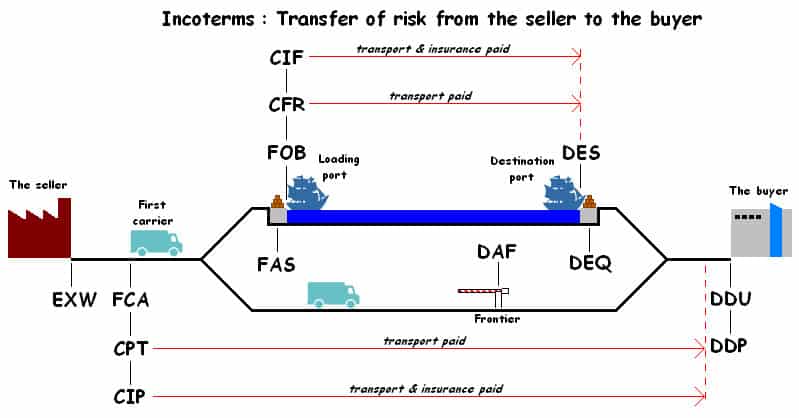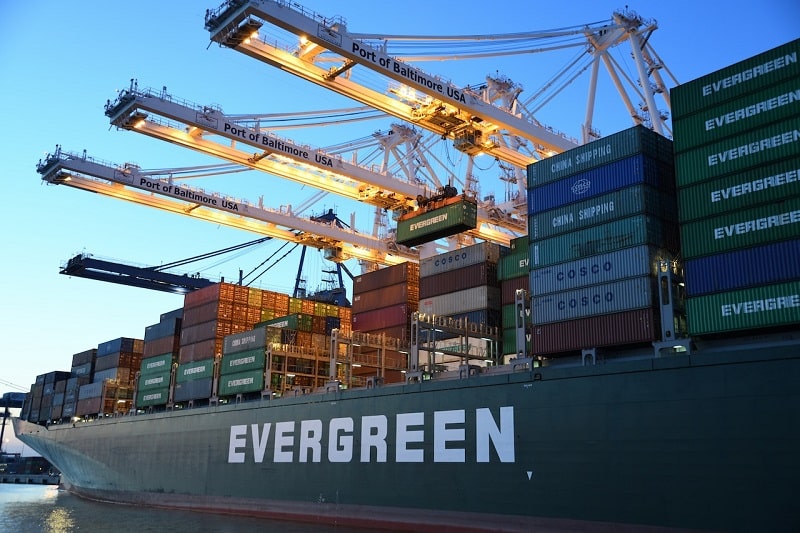International trade is a complex process that involves numerous steps, including the shipping and delivery of goods. One of the most crucial aspects of this process is understanding the different terms and definitions that are used in relation to shipping, trade, and incoterms. Incoterms is an acronym standing for international commercial terms. Incoterms are used from everyone, sellers and buyers around the world and are used in sales contracts. These terms can be confusing, especially for those new to international trade, but having a clear understanding of them is essential for ensuring successful and profitable transactions.
In this article, we will explore the different shipping terms, trade terms, and incoterms that are commonly used in international trade, and explain their meanings and significance. We will also provide real-life examples and best practices for navigating these terms, to help importers and exporters avoid potential risks and challenges in their international trade activities.
Shipping, Trade terms, and incoterms Definitions: An Overview
The history and evolution of shipping terms, trade terms, and incoterms can provide valuable context to their current usage. For example, the International Chamber of Commerce (ICC) created the Incoterms (International Commercial Terms) in 1936 to standardize the interpretation of commonly used trade terms in international trade. These terms have been updated and revised over time to reflect changes in global trade practices and technology.
- Shipping terms refer to the specific terms and conditions that define the responsibilities of the buyer and seller in a shipping transaction. These terms determine who is responsible for the cost of shipping, insurance, and other related expenses.
- Trade terms, on the other hand, refer to the specific terms and conditions that define the responsibilities of the buyer and seller in a sales transaction. These terms determine who is responsible for the cost of goods, delivery, and other related expenses.
- Finally, intercoms definitions are a set of international rules, standards, and guidelines that govern the interpretation of trade terms and shipping terms. They help ensure that these terms are understood and applied consistently across borders.
Technology has revolutionized international trade and has had a significant impact on the understanding and application of shipping terms, trade terms, and incoterms.

For example, digital platforms like Alibaba and Amazon have made it easier for buyers and sellers to connect and conduct business across borders. Technology has also facilitated the automation of trade processes, such as customs clearance and documentation, reducing the risk of errors and delays.
Definitions Explained : Shipping, trade terms and incoterms
Understanding the different terms and definitions that govern international trade is essential for businesses engaged in global commerce. Below we will provide an in-depth explanation of each component.
Shipping Terms : incoterms
Shipping terms are critical in determining the cost and responsibility of transporting goods from one location to another. The most commonly used shipping terms include FOB (Free on Board), CIF (Cost, Insurance, and Freight), and EXW (Ex Works) as well as DAP.

EXW (Ex Works): This term means that the seller makes the goods available at their premises, and the buyer is responsible for all costs and risks associated with transporting the goods from the seller’s premises to their destination.
FCA (Free Carrier) is another important shipping term, where the seller delivers the goods to a carrier or another person nominated by the buyer, either at the seller’s premises or another agreed location. The buyer assumes responsibility once the goods are loaded onto the carrier at the agreed-upon location.
FOB, for example, means that the seller is responsible for delivering the goods to the port of shipment and loading them onto the vessel. The buyer is responsible for the cost of transportation, insurance, and other related expenses once the goods have been loaded onto the vessel.
CIF, on the other hand, means that the seller is responsible for the cost of shipping, insurance, and freight until the goods reach the port of destination.
DAP (Delivered At Place): This term means that the seller delivers the goods to a specific location agreed upon by the buyer, and the buyer is responsible for unloading the goods and any additional costs, such as customs duties and taxes.
Advantages and disadvantages of different shipping terms can vary depending on the specific transaction and the parties involved. For example, FOB can be advantageous for buyers who have a preferred shipping company or want to have more control over the shipping process. However, it can be disadvantageous if the buyer has limited experience with shipping or if there are delays or damages during transit.
Trade Terms
Trade terms are critical in determining the cost and responsibility of delivering goods from one party to another. The most commonly used trade terms include DAP (Delivered at Place), DDP (Delivered Duty Paid), CIP (Carriage and Insurance Paid), and CPT (Carriage Paid To).
DAP, for example, means that the seller is responsible for delivering the goods to a specific location designated by the buyer. The buyer is responsible for the cost of unloading the goods and any customs duties or taxes.
DDP, on the other hand, means that the seller is responsible for delivering the goods to a specific location designated by the buyer, and they are responsible for all costs related to the import of the goods.
Advantages and disadvantages of different trade terms can vary depending on the specific transaction and the parties involved. For example, DAP can be advantageous for buyers who want more control over the shipping process and customs clearance. However, it can be disadvantageous if the buyer is inexperienced with importing goods or if there are unexpected costs or delays during transit.
Intercoms Definitions
Intercoms definitions are a set of rules, standards, and guidelines that provide a standardized interpretation of trade terms and shipping terms. The most commonly used intercoms definitions include Incoterms, UCP (Uniform Customs and Practice for Documentary Credits), and URC (Uniform Rules for Collections).
Incoterms, developed by the International Chamber of Commerce, are a set of standardized trade terms used globally to define the responsibilities of the buyer and seller in a shipping transaction. These terms specify who is responsible for the cost of transportation, insurance, and other related expenses.
UCP, on the other hand, provides a standardized set of rules and guidelines for the use of documentary credits in international trade. These guidelines ensure that banks and other financial institutions handle letters of credit in a consistent and transparent manner.
URC, similarly, provides standardized rules for the handling of documents related to collections in international trade. These rules help ensure that collections are handled in a transparent and consistent manner across borders.
Advantages and disadvantages of different intercoms definitions can vary depending on the specific transaction and the parties involved. For example, Incoterms can be advantageous for parties engaged in international trade by providing a standardized set of terms and definitions that help minimize disputes and misunderstandings. However, they can be disadvantageous if parties are unfamiliar with them or if there are unexpected costs or delays during transit.
Real-Life Scenarios
Real-life scenarios can help illustrate the importance and application of shipping terms, trade terms and incoterms in international trade. For example, suppose a buyer and seller agree to use FOB shipping terms. In that case, the buyer is responsible for arranging for transportation, loading the goods onto the vessel, and ensuring that they arrive at the destination port safely. The seller, on the other hand, is responsible for ensuring that the goods are delivered to the port of shipment and loaded onto the vessel.

Similarly, suppose a buyer and seller agree to use DDP trade terms. In that case, the seller is responsible for arranging for transportation, customs clearance, and delivery of the goods to the buyer’s specified location. The buyer is responsible for paying the seller the agreed-upon price and any applicable taxes or duties.
In both of these scenarios, the parties’ understanding and agreement on shipping terms, trade terms and incoterms are essential to the success of the transaction.
The Importance of Understanding International Terms
The Risks of Misunderstanding Shipping Definitions
Misunderstanding or misinterpreting shipping terms, trade terms or incoterms can result in significant risks and challenges for businesses engaged in international trade. These risks include disputes, delays, and unexpected costs. For example, if the buyer and seller have different interpretations of the shipping terms, the buyer may end up paying more for shipping and insurance than they had anticipated. This can lead to disputes and potentially legal action, which can be costly and time-consuming.
Benefits of Understanding all those Terms
On the other hand, deeply understanding these incoterms and logistics terms can bring numerous benefits to businesses engaged in international trade. These benefits include avoiding disputes, minimizing costs, and ensuring smooth transactions. When both parties clearly understand the terms and definitions, they are more likely to agree on the terms of the transaction, and there is less risk of disputes arising. Additionally, understanding these concepts can help businesses minimize costs by ensuring that they are not paying more than necessary for shipping, insurance, or other related expenses.
Best Practices for Navigating Shipping and Trade Terms
Navigating international trade can be a complex and overwhelming experience, especially when it comes to understanding the different terms and definitions that govern shipping, trade, and intercoms. As an importer or exporter, it’s crucial to have a thorough understanding of these terms and their implications to ensure a smooth and successful transaction.

We will provide you with some best practices for navigating the transport and incoterms in international trade. By following these tips, you can ensure that you fully understand the terms and definitions that apply to your specific trade transactions and avoid misunderstandings that could lead to costly mistakes.
Tip #1: Research and understand the different terms
Before engaging in any international trade transaction, it’s essential to research and understand the different terms that govern shipping, transport, and intercoms definitions. Familiarize yourself with the most commonly used terms and their implications, such as FOB, CIF, DAP, DDP, and Incoterms. By doing so, you can avoid misunderstandings and ensure that you and your trading partner are on the same page.
Tip #2: Communicate clearly with your trading partner
Clear communication is crucial when it comes to international trade, especially when discussing shipping, trade, and intercoms definitions. Make sure that you communicate clearly with your trading partner, ensuring that both parties fully understand the terms and their implications. If necessary, seek the help of a translator or interpreter to ensure that there are no misunderstandings.
Tip #3: Document everything
Documentation is critical in international trade, and this is particularly true when it comes to shipping, trade, and intercoms definitions. Make sure that all agreements and transactions are documented in writing, including any negotiations or changes to the terms. This documentation can help prevent misunderstandings and serve as a reference in case of disputes or legal issues.
Tip #4: Use reputable intermediaries
In some cases, it may be necessary to use intermediaries such as freight forwarders, customs brokers, or legal advisors to help navigate the complexities of international trade. When choosing intermediaries, make sure that they are reputable and experienced in handling international trade transactions. This can help ensure that your trade transaction goes smoothly and that any potential issues are handled promptly and professionally.
Tip #5: Be aware of cultural differences
International trade often involves dealing with different cultures and customs, which can have an impact on shipping, trade, and intercoms definitions. Make sure that you are aware of any cultural differences that may affect your trade transaction, and take steps to ensure that these differences are respected and accommodated.
Tip #6: Be aware of changes in regulations and policies
International trade regulations and policies can change rapidly, so it’s essential to stay up-to-date with any changes that may affect your trade transaction. This includes changes to shipping regulations, tariffs, and trade agreements. Staying informed and proactive can help you avoid any potential disruptions to your trade transaction.

Navigating shipping terms, trade terms, and intercoms definitions in international trade can be a daunting task. However, by following these best practices, you can ensure that you have a thorough understanding of the terms and their implications, communicate clearly with your trading partner, document everything, use reputable intermediaries, be aware of cultural differences, and stay up-to-date with changes in regulations and policies.
By doing so, you can increase the chances of a successful trade transaction and avoid costly mistakes and misunderstandings. As with any international trade transaction, preparation, communication, and attention to detail are key to a successful outcome.
In conclusion, this comprehensive guide has provided a thorough understanding of shipping terms, trade terms with incoterms in international trade. We have explored the most commonly used terms, their importance, advantages and disadvantages, and real-life scenarios that illustrate their application. By following the best practices outlined in this guide, importers and exporters can ensure they fully understand the terms and definitions that apply to their specific trade transactions. Remember, communication and documentation are key in ensuring a clear understanding and agreement on trade terms and definitions. We encourage readers to apply the knowledge gained in this guide to their own international trade activities and to always seek professional advice when necessary.

